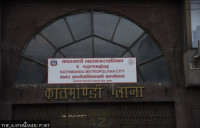Valley
Devotees throng banks of Salinadi
Hordes of pilgrims fill the one km long stretch of dusty road that leads to Salinadi from Sankhu Bazaar, which is situated 15 km east of Kathmandu.
Anup Ojha
On both sides of this road, shops made of bamboo sticks, plastics and other materials are being constructed. These shops sell everything from kitchen utensils and religious offerings to clothes, sweets, sandals, shoes, medicinal herbs and food grains. The sounds of the Swasthani’s religious sermons echo through the area. Much of that emanates from the stages that have been set up along the way for religious gurus to give sermons to the pilgrims about Shree Swasthani Mata.
This is the scene from the first day, Monday, of the month-long Swasthani Barthakatha that takes place on the road between Salinadi to Sankhu Bazaar. The festival begins every year on the first full-moon day of Poush, the ninth month of the Nepali calendar. In other places in Nepal during the month, Goddess Sri Swasthani is worshipped every day, and the tales of the goddess, Lord Shiva and other Gods are told in Hindu households.
According to the Shree Madhavnarayan Swasthani Brata Katha Salinadi Sudhar Samiti, which has been with monitoring the festival for years, more than four million people are expected to visit the place this year.
“Every year, the number of pilgrims we see keeps increasing. That’s probably because we have been able to improve the transportation system, and we have made better toilet and drinking facilities here,” said Dilip Kumar Shrestha, the chairman of the samiti.
This year 244 women and 14 men have signed up with the samiti to observe a fast for the entire month: Until the next full-moon day, they will be eating only one meal a day. Over the month, they will walk barefoot to Pashupathinath, Pharping, Panauti and Changunarayan and return to Sankhu. The rules for the fast are strict; the participants are not allowed to take medicines even if they fall sick or use soap while bathing, sit on a chair or sleep on a bed; they are also not allowed to touch anyone nor speak to or even think badly of others during the fast.
“This is my second time here. There has been a lot of peace and happiness in my family since I started fasting like this,” said Sarmila Jirel, who came all the way from Jiri. She said that during her stay here she has never fallen sick and has not experienced any discomfort. “This time, I am going to pray that our country be able to create an inclusive constitution, on time, for the betterment of all Nepali people,” said Jirel.
The locals of Sankhu say that the visit by the pilgrims has also helped the local economy. Twenty- two- year-old Prachan Shrestha, who sells prayer paraphernalia, said that during festival days, he does daily business worth at least Rs 5,000. “My parents have been setting up this shop since I was a child, and we have been able to make better earnings every year because the number of pilgrims keeps increasing every year,” he said.
The chairman of the samiti, Dilip Kumar, said that during the festival, more than 10,000 people work at the various stalls that sell goods along the stretch from Sankhu Bazaar to Salinadi. These traders come from Pharping, Banepa, Dhulikhel, Panauti, Jorpati, Kathmandu, Lalitpur and Bhaktapur. Some even come all the way from India.
“During other months, we farm. But during this festival, many of us come here to do business,” said Shrestha. According to Dilip Kumar, during the festival, the area sees business transactions of more than Rs 100 million. To help with crowd control and security, the festival has employed 81 police officials and 100 volunteers from
the samiti.




 24.87°C Kathmandu
24.87°C Kathmandu.jpg)











